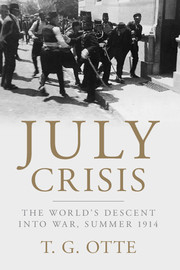Book contents
- Frontmatter
- Dedication
- Contents
- List of illustrations
- List of maps
- Preface and Acknowledgements
- List of abbreviations
- List of the principal dramatis personae
- Europe, 1914
- The Balkans, 1914
- Introduction
- 1 Prelude: the road to Sarajevo
- 2 Sarajevo and its echoes: 28 June to 5 July
- 3 The triumph of tactics over strategy: 6 to 21 July
- 4 Localizing the crisis: 19 to 23 July
- 5 The ultimatum: 23 to 26 July
- 6 Localizing the war: 26 to 28 July
- 7 Escalation: 29 July to 4 August
- Conclusion
- Index
- Plate section
- References
4 - Localizing the crisis: 19 to 23 July
Published online by Cambridge University Press: 05 July 2014
- Frontmatter
- Dedication
- Contents
- List of illustrations
- List of maps
- Preface and Acknowledgements
- List of abbreviations
- List of the principal dramatis personae
- Europe, 1914
- The Balkans, 1914
- Introduction
- 1 Prelude: the road to Sarajevo
- 2 Sarajevo and its echoes: 28 June to 5 July
- 3 The triumph of tactics over strategy: 6 to 21 July
- 4 Localizing the crisis: 19 to 23 July
- 5 The ultimatum: 23 to 26 July
- 6 Localizing the war: 26 to 28 July
- 7 Escalation: 29 July to 4 August
- Conclusion
- Index
- Plate section
- References
Summary
[S]uch moments of worry flew away like cobwebs in the wind. Although, every now and then, we thought of war, it was no different from contemplating death – as something that was possible but presumably far away.
STEFAN ZWEIG (1944)Jagow’s attempt to rationalize German decision-making up to this point of the crisis was tantamount to a declaration of political bankruptcy. Even though the head of the Wilhelmstrasse was acutely aware of the risks entailed in Berlin’s self-imposed passivity, he was determined to stay on the sidelines. There was, it is true, some tactical advantage to be gained from being able to maintain ignorance of Vienna’s intentions, if the crisis later escalated. But that in itself contained the risk – a not inconsiderable one as it turned out – of not being wholly credible. Above all, however, it meant abdicating all influence over the Habsburg leadership at the inception of Austria-Hungary’s planned offensive against Serbia; and that would make it all the more difficult to re-establish any kind of influence later on. Apparent ignorance was thus purchased at the price of impotence. To some extent, Berlin was driven by the perceived weakness of the Austro-Hungarian ally; and that fear of the spiralling decline of the Habsburg Empire gave Vienna a form of negative power over Germany. It was a case of the strong submitting to being led by the weak.
Being led by Vienna also meant being misled. For, by the middle of July, Count Berchtold no longer consulted with the government at Berlin. Indeed he was reluctant to share any information with the Wilhelmstrasse, and would not do so until he communicated, on 22 July, the full text of the ultimatum to be delivered to Belgrade. Berchtold did not wish to give Berlin the opportunity to change course and restrain Habsburg policy, as had been the case during the Balkan turmoil in 1912–13. But his sudden reserve also stemmed from a fear of leaks. By now almost three weeks had passed since the murder of the Archduke and his wife. Any careless indiscretion, any mischievous rumour – the two banes of the diplomatic profession – might force open the whole issue and bring about the interference of the other Powers. Such fears were not groundless.
- Type
- Chapter
- Information
- July CrisisThe World's Descent into War, Summer 1914, pp. 173 - 221Publisher: Cambridge University PressPrint publication year: 2014



